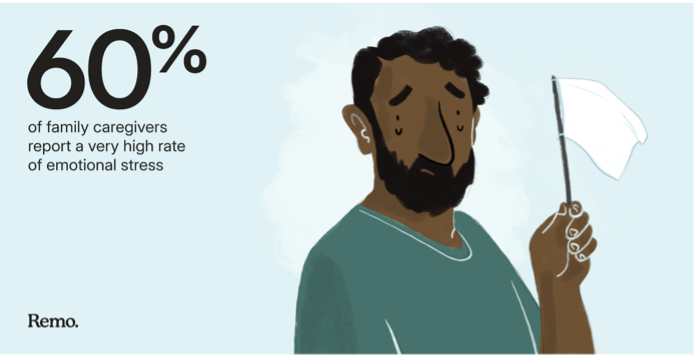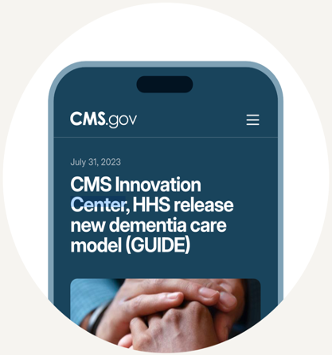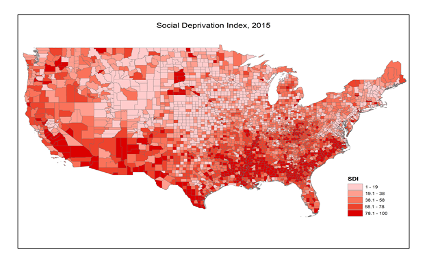By Holli White, MPS, Director of Health System Partnerships, HDAI
Key takeaways
- The current state of dementia care in the US is inadequate, with gaps in diagnosis, treatment, and caregiver support. This results in significant negative impacts on both patients and caregivers, as well as increased healthcare costs.
- CMS’ new GUIDE model offers a promising solution by incentivizing comprehensive dementia care and providing financial support to organizations meeting specific criteria.
- As a provider in the GUIDE program, Remo Health takes a data-driven approach to serving patients and caregivers.
- The partnership between Remo and Health Data Analytics Institute (HDAI) demonstrates the power of data analytics in identifying areas of greatest need and tailoring care delivery for optimal impact, particularly in underserved communities.
- HDAI transforms data into solutions that free up clinical time, enhance the provider experience, and increase the ability to have a positive impact on patient outcomes, efficiency, and economics.
The dementia care crisis
Dementia is a major public health issue in the United States today. Currently, there are nearly 7 million people in the United States who suffer from dementia and the condition is largely undiagnosed. These numbers are rising rapidly and the mortality rate for this condition is increasing as well – in the past decade, dementia-related deaths have increased by 145%.
The Alzheimer’s Association reports there is a significant lack of proactive screening and diagnosis, with only 16% of seniors undergoing regular cognitive screening. Sixty-five percent of primary care physicians (PCPs) are not comfortable diagnosing or managing dementia, and there is limited access to expert neurology care. This contributes to delayed diagnosis and recommendation of therapeutics that can slow disease progression.
The impact of dementia extends far beyond the individuals diagnosed — it profoundly affects their caregivers, too. More than 11 million Americans provide unpaid care for a loved one with dementia, yet there’s a lack of caregiver support, care coordination, and connection to community resources to address the wide range of non-medical needs for people with dementia. Taking on the role of caregiver demands extraordinary emotional and physical commitment – 74% of dementia caregivers say they are concerned about maintaining their own health, and approximately 60% of family caregivers report a very high rate of emotional stress.

An opportunity to drive better outcomes
There is a significant opportunity with dementia care, not only in terms of providing better quality of life for patients and caregiver support at the individual level, but to improve overall cost and quality to the healthcare system. A large body of literature shows that dementia leads to increased utilization, including 50% more emergency department utilization, a 40% increase in hospitalizations, and 3.3x overall cost. With additional support and treatment, some of this utilization is likely preventable.
Additionally, a stunning 34% of older adults are prescribed inappropriate medications, ¼ of hospitalizations among this population are due to preventable falls, and depression among caregivers of this population is associated with a 73%increased risk of ER utilization.
PCPs may be reluctant to diagnose or manage dementia, and many aging individuals are reluctant to seek help when experiencing cognitive decline due to the fear that their symptoms may be caused by a chronic disease. While this fear may be valid for some individuals, delaying diagnosis is often detrimental as it delays the opportunity for interventions that could improve symptoms or slow disease progression.
Introducing CMS’ new GUIDE model

CMS’ GUIDE model, a new payment model for Medicare beneficiaries, is founded on robust evidence that comprehensive support for both the patient and caregiver reduces adverse events and lowers total cost of care.
This is an eight-year demonstration program that provides per-patient, per-month reimbursement to organizations caring for patient-caregiver pairs (“dyads”) who fulfill key requirements. The key tenets of these requirements are, 1) a multidisciplinary care team delivering evidence-based dementia care, 2) access to that team and caregiver support services on a 24/7 basis, and 3) connection to community-based resources.
GUIDE will test whether comprehensive care, increased support, and coverage for respite services for caregivers will help delay admission to long-term care. Federal commitment to the program signals to providers, payors and dyads that dementia care needs reform – and the time is now.
The immediate priority is to identify the individuals and institutions in communities across the country needing assistance.
This is where HDAI comes in.
How HDAI partners to enhance outcomes and assess performance
HDAI’s (www.hda-institute.com) Intelligent Health Management System, HealthVisionTM, is a first-in-class enterprise solution leveraging real-time predictive analytics and generative AI to deliver improved outcomes, efficiencies, and economics for health systems and value-based care organizations.
HDAI’s solutions and services deliver value to clinicians and organizations in two ways:
- HDAI synthesizes massive amounts of data to concisely summarize and identify key information and presents it in simple views that free up valuable clinical time and enhance the provider experience.
- HDAI delivers data-driven insights that align effort and limited resources with needs, to deliver personalized care with the greatest impact on outcomes, efficiency, and economics.
Taking a data-driven approach
This summer, Remo Health was announced as a GUIDE participant. Remo delivers virtual, comprehensive care to people living with dementia as well as their family caregivers. Their mission is to redefine the standard of dementia care and make quality care accessible to all. Remo provides whole-person, wraparound care to the dyad. This includes clinical care, community support, and evidence-based resources to support the dyad across the entire disease journey.
Remo partnered with HDAI to quantify the absolute and relative needs of patients throughout the entire nation for dementia diagnosis and intervention. The results revealed those regions, institutions, and practices with the greatest needs.
HDAI conducted a comparative outcomes analysis using the CMS Medicare Database. HDAI has privileged access to the CMS database, which provides complete longitudinal records of patient utilization of inpatient, outpatient, skilled nursing, home health, office, or hospice resources. These claim records provide detailed past medical history per patient – including medical status, interventions, medications, and costs.
HDAI utilized this resource in two ways:
First, HDAI developed hundreds of predictive models using published methodologies. These models identify drivers of risk for a given individual; providers and care teams typically use this information to identify and focus on their riskiest patients to reduce the risk of unfavorable events and cost. Second, HDAI uses the database to benchmark every provider, hospital, and organization to help better understand true performance without needing any data from the systems directly. In this project, HDAI focused on providing results for regions, such as county-level data, as well as institutions, such as home health agencies. These models identify drivers of risk for a given individual; providers and care teams typically use this information to identify and focus on their riskiest patients to reduce the risk of unfavorable events and cost. Second, HDAI uses the database to benchmark every provider, hospital, and organization to help better understand true performance without needing any data from the systems directly. In this project, HDAI focused on providing results for regions, such as county-level data, as well as institutions, such as home health agencies.

To derive the outcomes for a given cohort relative to the nation – for a specific county, for example – HDAI matched each patient to all similar patients throughout the nation using proprietary ‘Digital Twinning’ methodology. This method matches patients to control for differences in demographic, institutional, and regional characteristics. Most importantly, when examining relative outcomes for adverse events, utilization and cost, HDAI additionally matches patients on the predicted risk of the outcome using risk prediction models.
This process provides risk-adjusted comparative results. That is, the matched analysis provides three metrics for each endpoint:
- The absolute results, for a cohort of interest
- The expected results, the results for matched patients
- The relative results, as the ratio of the Actual to Expected (“A/E”), which provides the relative, risk-adjusted results. Regions having either high or low A/E (depending on the metric) are those having the greatest needs for that endpoint.
For this analysis, HDAI utilized all Medicare FFS beneficiaries over the past five years with criteria consistent with the GUIDE requirements: patients who had dementia, were enrolled in Medicare Parts A & B (but were not enrolled in Medicare Advantage), and who weren’t enrolled in in special needs plans such as PACE, a long-term nursing home, or hospice.
HDAI calculated the absolute and relative total cost of care for dementia beneficiaries (PMPY) and provided total cost as well as by spend subcategory: inpatient, outpatient, carrier, home health, and skilled nursing. To help assess drivers of those costs, HDAI provided absolute and relative rates of utilization of services, like inpatient and ER Utilization, reported in visits per 1000 beneficiaries.
Accurately assessing need for services
As we’ve discussed, dementia is a highly undiagnosed condition — only 45% of patients receive an accurate diagnosis. To that end, looking only at the prevalence of diagnosed dementia in a given region is insufficient in understanding that community’s true need for comprehensive dementia care services that include diagnosis, treatment and ongoing support.
In solving for this, Remo and HDAI worked together to examine 1) which regions have a low density of neurologists/geriatricians and a high Area Deprivation Index, and 2) which communities have a high proportion of Medicare beneficiaries with risk factors for dementia. The analysis supported the teams’ ability to shine a light on communities that have the greatest need for diagnostic services.
Promoting health equity in dementia care
Remo and HDAI’s joint goal was to identify regions with the greatest needs – and to do so, HDAI needed to utilize composite metrics of social determinants of health like the Area Deprivation Index (ADI) and the Social Deprivation Index (SDI).

SDI was developed to quantify the disadvantage level of communities as it relates specifically to health care access and health outcomes. SDI is composite measure of seven demographic characteristics collected in the American Community Survey, including:
- % of the population less than 100% of Federal Poverty Level
- % of the population 25 years or older with less than 12 years of education
- % of non-employment for population 16-64 years old
- % of households living in renter-occupied housing
- % of households living in crowded housing units
- % of single parent families with dependents <18 years old
- % of households with no vehicle
By reporting the absolute value of a deprivation index per county, we could identify areas that historically have been underserved. By matching patients on the county’s deprivation index, the comparative analysis results would then highlight those communities that were particularly underserved for the dementia community, even after controlling for absolute level of deprivation.
How Remo Health is paving a better path
Remo’s approach focuses on delivering comprehensive, whole-person care to both the person living with dementia and their caregiver. Critically, Remo’s digital platform delivers virtual care to dyads wherever they are, which meaningfully works towards closing care gaps in rural and underserved communities that historically have not had access to quality, affordable care.
In addition to virtual, comprehensive care delivery, Remo’s proprietary tech platform leads the charge in building a true learning healthcare system for dementia. Not only is Remo providing better dementia care to dyads today – Remo is paving a path towards building a systemic, widely adoptable care model that will impact millions of families.
Where we go from here
The challenges in dementia care are significant, but the potential for improvement is immense. Remo Health, in collaboration with the HDAI, is leading the charge in transforming the landscape of dementia care through a data-driven approach. By identifying the regions and individuals with the greatest needs, Remo can ensure that its comprehensive, virtual care model reaches those who need it most.
This innovative approach, coupled with the promising GUIDE model, has the potential to redefine the standard of dementia care, improve outcomes for patients and caregivers, and create a more equitable and accessible system for all. The future of dementia care is more promising than ever, and Remo Health is at the forefront of this transformation.
Contact us!
If you are interested in exploring more data-driven approaches within your organization, would like to discuss your work in the healthcare space, or just learn more about HDAI, please reach out to [email protected]. We would love to speak with you.
Want to learn more about Remo Health? Interested in building a dementia care program for your organization? Reach out to [email protected].
Executive Summary
We examine the current state of dementia care in the United States, highlighting the significant gaps in diagnosis, treatment, and support for both patients and caregivers. We discuss Centers for Medicare & Medicaid Services’ (CMS) new GUIDE model, a promising initiative that aims to improve dementia care through comprehensive, patient-centered support and reimbursement models.
Remo Health, a participant in the GUIDE program, is revolutionizing dementia care by providing virtual, whole-person care to patients and their caregivers. To optimize care delivery and identify areas of greatest need, Remo partnered with Health Data Analytics Institute (HDAI). By leveraging HDAI’s expertise in data analysis and predictive modeling, Remo was able to pinpoint the regions and populations most in need of dementia care services.
This data-driven approach not only informs Remo’s strategic decisions but also contributes to the development of a learning healthcare system for dementia. By focusing on underserved communities and addressing health disparities, Remo is paving the way for a more equitable and accessible dementia care. The collaboration between Remo and HDAI demonstrates the power of data-driven strategies in transforming healthcare and improving the lives of those affected by dementia.
SHARE
